IIAS and Surabaya: A Portrait of Knowledge Sharing across Continents
IIAS’s engagement with the city of Surabaya in East Java, Indonesia, formally commenced in December 2017 with the organization of two events by the IIAS Cities Cluster, in collaboration with local partners: (1) the “River Cities in Asia” workshop of the Urban Knowledge Network Asia (UKNA), held at the Airlangga University (UNAIR) Faculty of Humanities; and (2) the first workshop of the Southeast Asia Neighborhoods Network (SEANNET), held in the Surabaya neighborhood (kampung) of Peneleh.
Today, the IIAS-Surabaya relationship has blossomed into a fully-fledged partnership, involving also broader initiatives, including the new Airlangga Institute of Indian Ocean Crossroads (AIIOC) and the joint organization, with UNAIR, of the International Convention of Asia Scholars (ICAS) in the city in July-August 2024.
This article comprises a collection of narratives collected in July 2023 from academics, institutional partners, and communities in Surabaya about their perspectives on collaborative knowledge sharing with IIAS.
In the beginning… neighborhoods and rivers
When the Southeast Asia Neighborhoods Network (SEANNET) started in 2017, Surabaya was one of the six cities in the region that had a team of researchers and community partners in the program. SEANNET was an integrated initiative of research and pedagogy, with active engagement of communities on the ground. The local anchor of SEANNET in Surabaya was UNAIR Faculty of Humanities member Adrian Perkasa, a historian who eventually went to Leiden University in 2019 to pursue his doctorate.
The first SEANNET workshop took place in Surabaya in December 2017, at the same time as the UKNA- and IIAS-supported “River Cities in Asia” workshop, which brought together scholars working on the river-city relationship in various countries of the region. The workshop was inspired by Surabaya’s geographical location but resonated widely throughout Asia. The meeting shaped a book project published by the Asian Cities series of Amsterdam University Press in 2022, entitled River Cities in Asia: Waterways in Urban Development and History, edited by Rita Padawangi, Paul Rabé, and Adrian Perkasa.
Perspectives on broader collaboration
Fast-forward six years, and today the IIAS-Surabaya relationship is a multi-pronged and multi-stakeholder partnership, with UNAIR at its center.
The Rector of UNAIR, Prof. Mohammad Nasih, will be the institutional host of the International Convention of Asia Scholars (ICAS) in Surabaya in 2024 – a large event that will stimulate activities across the city, in the spirit of the “city as campus” [Fig. 1]. According to the Rector, Surabaya’s hosting of ICAS, as the flagship event of IIAS, is part of the process of a continuously growing collaboration.
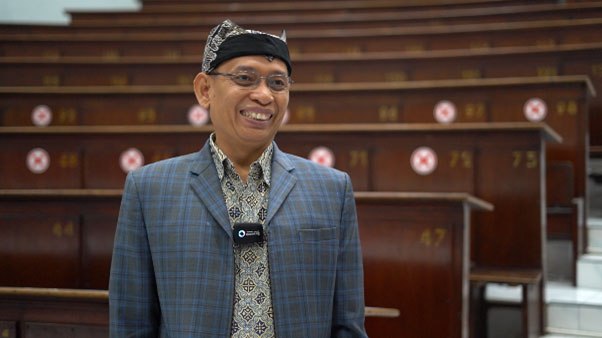
Fig. 1: Prof. Mohammad Nasih, Rector of Universitas Airlangga. (Photo by Ari Trismana, July 2023)
The working relationship between IIAS and UNAIR has intensified in recent years through grounded research projects, educational activities, and community engagements, both through institutional connections and roles of individual researchers. “IIAS has actively contributed in many aspects, especially research, and IIAS has also contributed in community development, community services,” said Prof. Nasih.
Community leaders at Kampung Peneleh, the SEANNET research site in Surabaya, corroborated that view. One of the activities was “kampung mapping, starting from the west side until the east side”, as expressed by Mr. Rizal Aries, leader of Kampung Peneleh’s neighborhood of RT 04 RW 04 [Figs. 2-3].
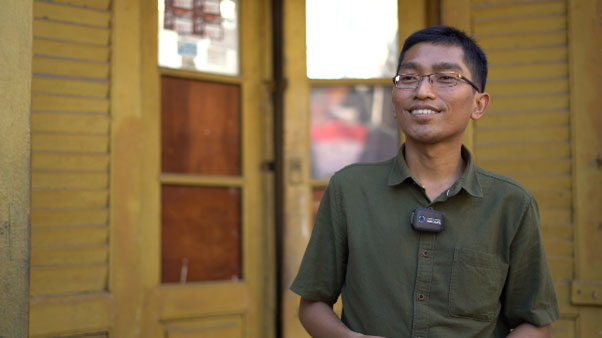
Fig. 3: Mr. Rizal Aries, Community Leader at Kampung Peneleh, RT 04 RW 04. (Photo by Rita Padawangi and Paul Rabé Ari Trismana, July 2023)
Another community leader, Mr. Yulian Zainul Ma’ali from the neighborhood RT 05 RW 03, testified [Fig. 4]: “For us, SEANNET is very helpful. It enables us to meet with people from overseas, students, and support our local economy. Such visits empowers our small businesses, for example, the foreign visitors could get to know local Peneleh-Surabaya culinary tradition. So they could enjoy the delicacies, while getting to know the heritage buildings in Peneleh.”
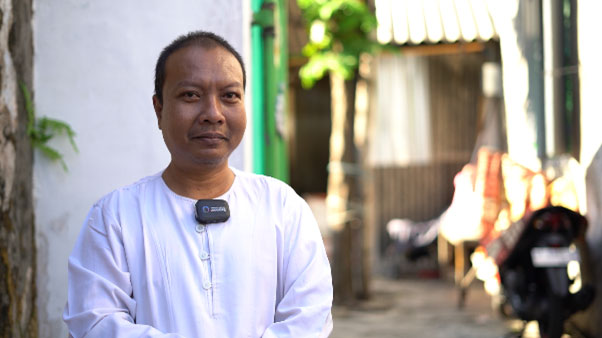
Fig. 4: Mr. Yulian Zainul Ma’ali, Community Leader at Kampung Peneleh, RT 05 RW 03. (Photo by Ari Trismana, July 2023)
IIAS’s work through SEANNET in Surabaya has also reached beyond the academic community. Urban Sketchers Surabaya, for example, is a community of artists, architects, and others from diverse backgrounds who come together for their love of sketching urban spaces. “Urban Sketchers Surabaya (USS)’s collaboration with SEANNET started in 2019, we had an idea, a concept, to conduct a series of sketches that integrate tradition, heritage, and unique activities in Peneleh as a settlement,” said Mr. LK Bing, leader of USS [Fig. 5]. “The activity was really memorable because usually we only make sketches of buildings and atmospheres, separate from the interesting stories.”
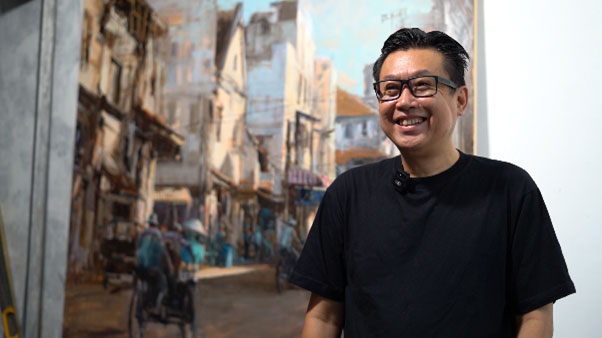
Fig. 5: Mr. LK Bing, artist-architect, Leader of Urban Sketchers Surabaya (USS). (Photo by Ari Trismana, July 2023)
IIAS’s collaborative endeavor in Surabaya intensified in recent years as SEANNET, UKNA, and – more recently – the Africa-Asia initiative converged at UNAIR. In 2023, the Rector of UNAIR decreed the formation of the Airlangga Institute of Indian Ocean Crossroads (AIIOC). Prof. Nasih, Rector of UNAIR, acknowledged IIAS’s support in the shaping of AIIOC: “From our collaborative initiative, and unrelenting support from IIAS, Universitas Airlangga formed and developed a strategic unit (AIIOC), that, insha Allah, will join in contributing to knowledge-building, in collaboration with IIAS.”
AIIOC at UNAIR embodies that collaborative spirit by engaging faculties from different disciplines. AIIOC brings together the Faculty of Humanities, Faculty of Social and Political Sciences, Faculty of Medicine, and Faculty of Public Health of UNAIR to be actively involved in the day-to-day running and strategic planning of the institute. “In shaping AIIOC, forming infrastructure, IIAS really helped us to build a very strong foundation, how to start the institution, not from somewhere that we don’t know, but we really start with the very good structure. We know how to do,” says Dr. Lina Puryanti, the founding director of AIIOC [Fig. 6]. Dr. Puryanti, currently also the Vice-Dean of the Faculty of Humanities, actively mentions the indispensable roles of Vice-Deans of the Faculty of Social and Political Sciences, the Faculty of Public Health, and the Faculty of Medicine, all of which are structurally important in the running of AIIOC currently and will remain so in the future.
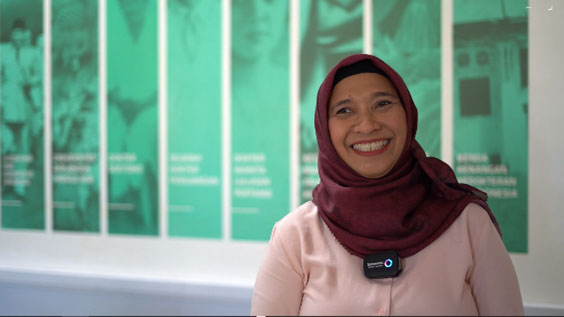
Fig. 6: Dr. Lina Puryanti, Director of Airlangga Institute of Indian Ocean Crossroads (AIIOC), Universitas Airlangga. (Photo by Ari Trismana, July 2023)
AIIOC at UNAIR will be the key institution in carrying out the organizing of ICAS 13 in Surabaya in 2024. “It’s an honor for us, for Universitas Airlangga, to be trusted to host the international convention, the International Convention of Asia Scholars (ICAS),” says Prof. Nasih. Realizing ICAS as an important responsibility but also opportunity, Dr. Puryanti expressed: “ICAS as one of the biggest conferences in the world absolutely is a very huge and give any institution that be the host will have a very huge benefit.” Prof. Nasih highlights that ICAS aligns with UNAIR’s larger strategy. “It aligns with UNAIR’s strategy to “go global”, to be a world university, to be on the world stage, to contribute actively in shaping the world civilization positively, one that is productive, and glorious.”
ICAS 2024 will manifest such spirit of collaboration. “ICAS in Surabaya will be designed as the con-fest, conference-festival, so this is a non-traditional conference with people [not] only attending panels within classrooms, but we are also trying to make the conference really engaged with the society,” says Dr. Puryanti. As a continuation of a growing knowledge sharing in Surabaya, ICAS 2024 will integrate existing collaborative efforts that had started from SEANNET and had grown since then [Fig. 7].
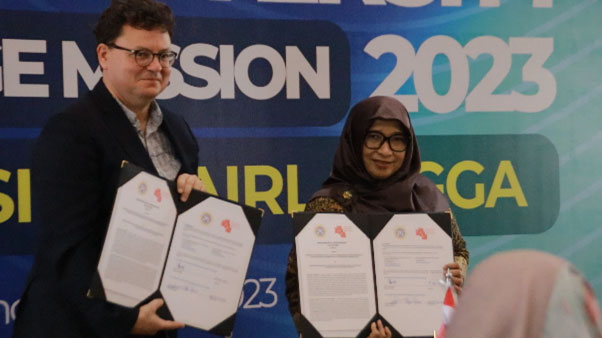
Fig. 7: Dr. Philippe Peycam, Director of IIAS, with Dr. Lina Puryanti, Director of AIIOC. (Photo courtesy of PKIP UNAIR, May 2023)
There will be high expectations of ICAS 13 in 2024, especially because it is also going to be the first in-person ICAS since COVID-19 shut down global travel for several years. At the same time, it is also an exciting opportunity to re-think the role of academia and to actively engage with communities on the ground. “SEANNET has been really supportive for us… because SEANNET has been supporting our residents to get to know the outside world, people from other countries,” said Mr. Rizal Aries from Kampung Peneleh [Fig. 8].
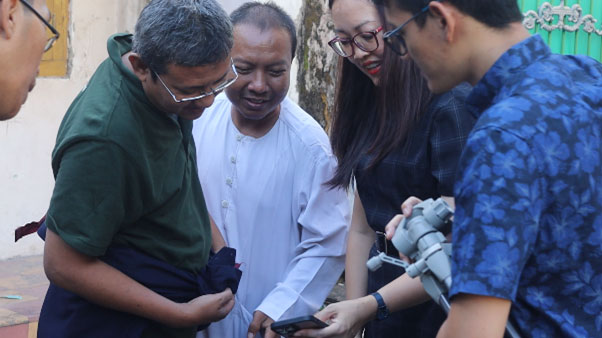
Fig. 8: SEANNET Coordinator Dr. Rita Padawangi with local Principal Investigator of SEANNET Surabaya Awang Firmansyah, Yulian Zainul Ma’ali, and Mr. Rizal Aries.
Mr. LK Bing from Urban Sketchers Surabaya (USS) aspires to continue from an existing relationship with SEANNET as one of the earlier collaborative endeavors facilitated by IIAS in Surabaya: “This (Peneleh Dalam Sketsa / Peneleh Sketchbook) is the evidence that recorded our collaboration, Urban Sketchers Surabaya-SEANNET collaboration that was so memorable for us. We hope this collaboration will always continue in the future.”
Through the narratives from Surabaya, we have seen how the works of IIAS have touched many communities, from academics to residents to other communities in the city. The experience from Surabaya may be unique, but it serves as an example of how IIAS and its Cities Cluster continues to grow through collaborative knowledge sharing, and through making this sharing a co-constructive effort to equally empower all who are involved.
IIAS’s 30th anniversary is a moment in which collaborators also express their aspirations about the future: more intensive collaboration, working hand-in-hand, and carving meaningful memories together through the process.
Rita Padawangi is Associate Professor at Singapore University of Social Sciences and Coordinator of SEANNET 2.0.
ritapadawangi@suss.edu.sg
Paul Rabé is Coordinator of the Asian Cities Cluster at IIAS.
p.e.rabe@iias.nl